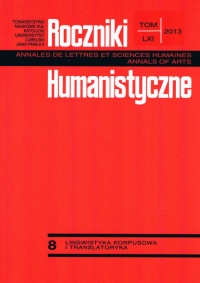Testament : entité – concept – termes français et polonais dans leurs relations pluridimensionnelles
Abstrakt
Testament: byt – pojęcie – francuskie i polskie terminy w ich wielowymiarowych relacjach
Celem artykułu jest porównanie ekwiwalentów opracowanych na podstawie analizy dwujęzycznych tekstów porównywalnych z ekwiwalentami zapisanymi w dwujęzycznym słowniku specjalistycznym. Na przykładzie testamentu przedstawiona jest metoda analizy językoznawczej terminów na bazie metafizyki realistycznej, która pozwala połączyć strukturę ontyczną testamentu, jego konceptualizację (struktura ontologiczna) oraz strukturę morfologiczną i składniową wyrażeń językowych terminu. Na tej podstawie opisane są francuskie i polskie kolokacje oraz terminy złożone jako jednostki dyskursu w tekstach prawa francuskiego i polskiego. Są one wydobywane z tekstu za pomocą realnej definicji terminologicznej i ukazane w ich kombinatoryce syntagmatycznej na poziomie metajęzykowym w postaci zdań źródłowych. Autorka wskazuje na konieczność uwzględnienia typu tekstu specjalistycznego i jego kontekstu historycznego w ustalaniu ekwiwalentów terminologicznych.
Bibliografia
Depecker Loïc, 2003, Entre signe et concept : éléments de terminologie générale, Paris, Presses Sorbonne Nouvelle. (Réimpression 2009).
Depecker Loïc, 2005, « Contribution de la terminologie à la linguistique », Langages, n° 157, 6–13.
Gilson Etienne, 1969, Linguistique et philosophie. Essais sur les constantes philosophiques du langage, Paris, Vrin.
Harris Zellig Sabbetaï, 1988, Language and Information, New York, Columbia University Press; trad. fr. Ibrahim (A.H.) et Martinot (C.), La langue et l’information, 2007, Paris, Cellule de recherche en linguistique, crl.exen.fr.
Kleiber Georges, 1999, Problèmes de sémantique. La polysémie en question, Villeneuve, Presses Universitaires du Septentrion.
Krąpiec Mieczysław Albert, 1995, Język i świat realny, Lublin, Wyd. KUL.
Lerat Pierre, 1995, Les langues spécialisées. Paris, PUF.
Lerat Pierre, 2008a, « Terminologie et ontologie juridiques. A propos du contrat de crédit lié en droit communautaire », Studi italiani di linguistica teorica e applicata, XXXVII-2, 327–343.
Lerat Pierre, 2008b, « Texte spécialisé et terminologie » Intralinea (www.intralinea.org/print/ article1732).
Lerat Pierre, 2010, « Variabilité et harmonisation terminologique » ; Publifarum (n° 12, Atti Convegno Assiterm 2009, www.publifarum.farum.it).
Martin Robert, 2001, Sémantique et automate, Paris, PUF.
Parla Marta, 2013, La terminologie française et polonaise du droit des successions, Mémoire de maîtrise, Lublin, KUL.
Śliwa Dorota, 2011a, « Cœur et sentiments: une étude cognitive des collocations françaises et polonaises » [in :] A. Krzyżanowska, R. Jakubczuk (dir.), Parler des émotions : entre langue et litterature, Lublin, Wyd. UMCS, 191–199.
Śliwa Dorota, 2011b, « Les inférences à fondement lexical – pour une dimension ontologique de la sémantique lexicale », [in :] Actes du Colloque « La ‘logique’ du sens : de la sémantique à la lexicographie : débat critique autour des propositions de Robert Martin », Metz, Recherches Linguistiques 32, 229–238.
Śliwa Dorota, 2013, Formation des noms et des termes composés français et polonais : de la cognition à la traduction, Lublin, TN KUL.
Temmermann Rita, 1999, « Why traditional terminology theory impedes a realistic description of categories and terms in the life sciences», [in :] Terminology, vol.5, n. 1, 77-92,
Temmermann Rita, 2000, « Une théorie réaliste de la terminologie: le sociocognitivisme », [in :] Terminologies Nouvelles, vol. 21, 58–64.
Copyright (c) 2013 Roczniki Humanistyczne

Utwór dostępny jest na licencji Creative Commons Uznanie autorstwa – Użycie niekomercyjne – Bez utworów zależnych 4.0 Międzynarodowe.





